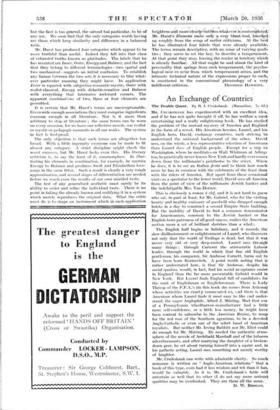An Exchange of Countries
The Double Quest. By R. J. Cruikshank. (Macmillan. is. 6d.)
MR. CRUIKSHANK has experimented with an excellent idea, and if he has not quite brought it off, -he has written' a rdpit entertaining and a really enlightening book. He has studied the problem' of the mutual mystery of America and Engifind in the form of a novel. His American heroine, Laurel, and his English hero, David, exchange countries, each striving to understand the national background of the other. David sees, on the whole, a less representative-.selection of Americans than Laurel does of English people. Except for a trip to Washington, where he meditates on Walt Whitman at Arling- ton, he practically never leaves New York and hardly ever comes down from the millionaire's penthouse to the street. When he does, it is to see an Italian fiesta and' to think how much more he has in common with the celebrantS of the feast than with the rulers of America. But apart from these occasional visits as a spectator to the lower world, David sees all America from the point of view of the millionaire Jewish banker and the indefatigable Mrs. Van Horner.
This is obviously a roman a clef, and it is not hard to guess who sat, in part at least, for Mr. Gabriel, who for the visiting hearty and healthy emissary of goodwill who dropped enough bricks in a day to construct a second Empire State building. But the inability of David to find a common denominator for Americanism, common to the Jewish banker or the English-born patroness of all good causes, makes the American section more a set of brilliant -sketches -than a whole.
The English half begins in Salisbury, and it records the, slow disillusionment or enlightenment of Laurel, who discoVers
not only that the world of Trollope is dead, but that it was never' very old or very' deep-rooted. Laurel sees thrangli many things ; through Carteret the aristocratic Labour leader, through the world in which that • fine old English gentleman, his conqueror, Sir Ambrose Cornett, turns out to have been born Korrtovitch. A point worth noting that is rather understated here, is that Sir Ambrose, despite ,hia social qualms, would, in fact, find his social aceeptanee easier in England than the far more presentable Gabriel would in New York. But Laurel finds England full of candidates 'for the rank of Englishman or Englishwoman. There is Lady Throop of the F.F.A.'s (in this book she comes from Arizona) whose activities are cruefy commented on, t nd there is that American whom Laurel finds it most easy to like and under- stand, the eager Anglophile,' Alfred J. Minting. Had that son of a Pennsylvania wheelbarrow-manufacturer had a little more self-confidence, or a little less money, he might have been content to subscribe to the American Review, to weep for the red rose of the Southern agrarians, to be a devoted Anglo-Catholic or even one of the select band of American royalists. But neither Mr. Irving Babbitt nor Mr. Eliot could do enough for Mr. Minting. He needed the authentic atmo- sphere of the novels of Archibald Marshall and. of tbe _tobacco advertisements, and after marrying the daughter of a broken- down peer, he set about turning himself into a squire and, in his pathetic acting, Laurel sees something not merely worthy of laughter.
Mr. Cruikshank-can write with admirable clarity. So much nonsense is written on !` Anglo-American relations that a book of this type, even had it less wisdom and wit than it has, would be valuable. As it is, Mr. Cruikshank's fable will entertain so well that its other (I do not say more serious) qualities may be OverlOoked. They are there all the same.
D. W. BROGAN.


































































 Previous page
Previous page